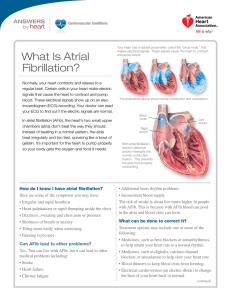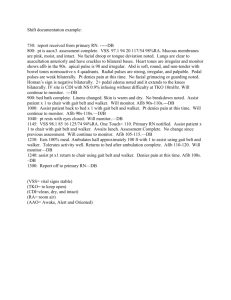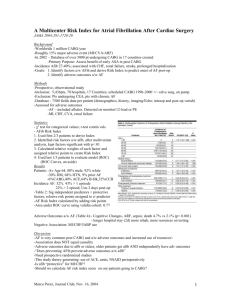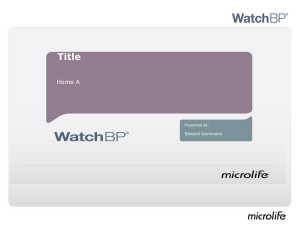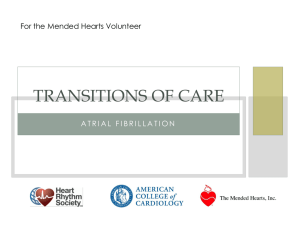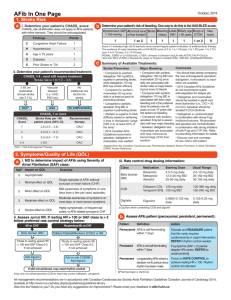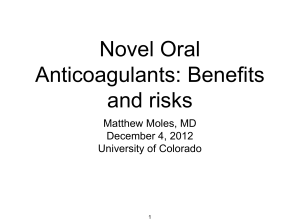FAQs of Atrial Fibrillation - American Heart Association
advertisement
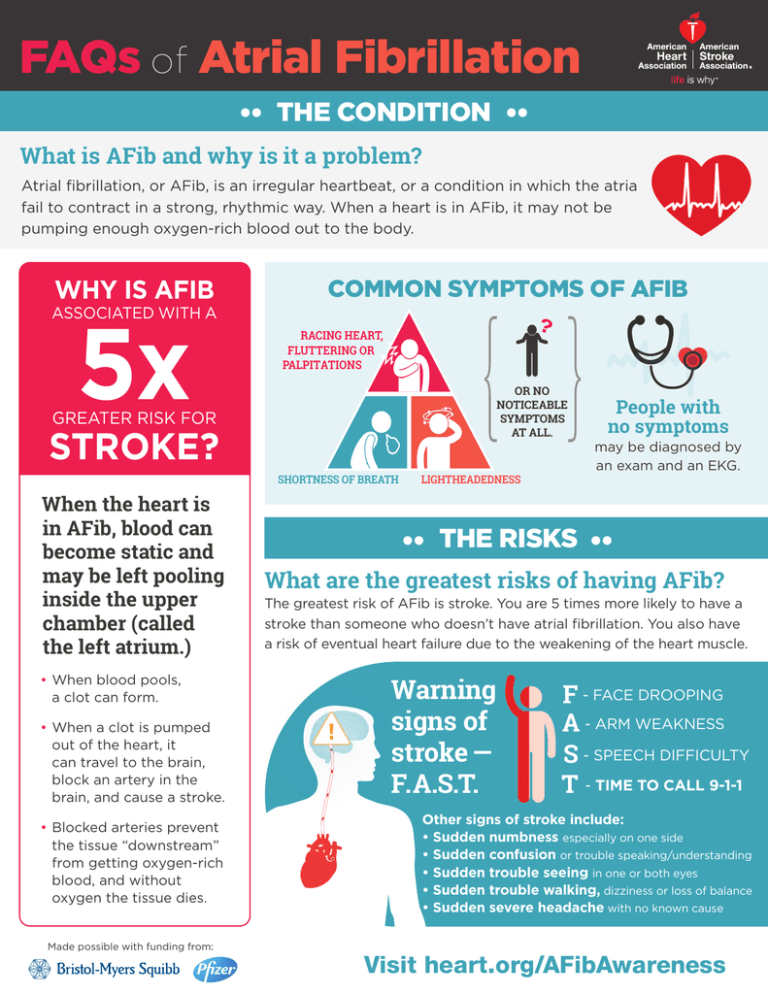
FAQs of Atrial Fibrillation THE CONDITION What is AFib and why is it a problem? Atrial fibrillation, or AFib, is an irregular heartbeat, or a condition in which the atria fail to contract in a strong, rhythmic way. When a heart is in AFib, it may not be pumping enough oxygen-rich blood out to the body. WHY IS AFIB ASSOCIATED WITH A 5x COMMON SYMPTOMS OF AFIB RACING HEART, FLUTTERING OR PALPITATIONS OR NO NOTICEABLE SYMPTOMS AT ALL. GREATER RISK FOR STROKE? SHORTNESS OF BREATH When the heart is in AFib, blood can become static and may be left pooling inside the upper chamber (called the left atrium.) • When blood pools, a clot can form. • When a clot is pumped out of the heart, it can travel to the brain, block an artery in the brain, and cause a stroke. • Blocked arteries prevent the tissue “downstream” from getting oxygen-rich blood, and without oxygen the tissue dies. Made possible with funding from: LIGHTHEADEDNESS People with no symptoms may be diagnosed by an exam and an EKG. THE RISKS What are the greatest risks of having AFib? The greatest risk of AFib is stroke. You are 5 times more likely to have a stroke than someone who doesn’t have atrial fibrillation. You also have a risk of eventual heart failure due to the weakening of the heart muscle. Warning signs of stroke — F.A.S.T. F - FACE DROOPING A - ARM WEAKNESS S - SPEECH DIFFICULTY T - TIME TO CALL 9-1-1 Other signs of stroke include: • Sudden numbness especially on one side • Sudden confusion or trouble speaking/understanding • Sudden trouble seeing in one or both eyes • Sudden trouble walking, dizziness or loss of balance • Sudden severe headache with no known cause Visit heart.org/AFibAwareness HOW DID I GET AFIB? Many people do not know how they developed AFib, but it is most often caused by a combination of factors. Possible risk factors for AFib are: POSSIBLE HEART HEALTH FACTORS Prior Heart High Blood Attack or Pressure Heart Disease Diabetes Sleep Apnea ! What treatments should I expect? In certain cases, medical intervention may be needed to restore the heart’s normal rate and rhythm, and many AFib patients need medication to lower stroke risks. AFib interventions may involve cardioversion, “blood thinners,” medications for rate and/or rhythm control, and possibly catheter ablation or surgery if other treatments fail to reduce risks and symptoms. Let your doctor know if you are having symptoms, and continue following your doctor’s orders until otherwise directed. BEHAVIORS THAT MAY BE ASSOCIATED Excessive Alcohol Smoking Prolonged Athletic Conditioning If I have no AFib symptoms, am I still at risk for stroke? Yes! Do not stop taking medication simply because you are not experiencing noticeable symptoms. Many people with AFib should be on anticoagulant medications which will lower stroke risks when taken correctly. When do I see my doctor? As soon as you notice the symptoms of AFib, contact your physician. Even if your symptoms go away, it’s still important to have a physical exam and monitor your heart’s activity. Symptoms may include: • A racing, fluttering, pounding or irregularfeeling heartbeat • Fatigue, dizziness or lightheadedness • Shortness of breath or fainting • Anxiety Made possible with funding from: RACING HEART, FLUTTERING OR PALPITATIONS SHORTNESS OF BREATH LIGHTHEADEDNESS Visit heart.org/AFibAwareness LIVING WITH AFIB Does having AFib mean I need to wear a medical alert bracelet or carry a card in my wallet? In any emergency situation, having a patient’s medical history is very helpful. Be sure and write down the medication that you are taking and the dose. If you are taking oral anticoagulant medications, ("blood thinners"), always wear a medical alert bracelet or carry a wallet card to be sure healthcare providers would know how to best care for you, should an emergency occur. Can I tell when I’m going to have an episode of AFib? Some people can feel when they are in AFib and some people do not know. Either way, you may be able to control “triggers.” In some people, different things cause their AFib to flare up. ? Common triggers may include: caffeine, stress, poor sleep, and – for some people – exercise that increases the heart rate above a certain point. It is important to note that exercise is beneficial for many people with AFib. COMMON “TRIGGERS” Energy Drinks Although normal amounts of coffee should not trigger AFib, further study may be warranted for “energy drinks.” Excessive alcohol Stress or anxiety Can I drive my car? Poor sleep and/or sleep apnea Am I able to have sex or exercise? Yes, as long as you are cleared by your physician, you are able to perform any normal activities of daily living that you are able to tolerate. Made possible with funding from: Most can, but check with your doctor. Some people experience dizziness or even fainting with their AFib episodes. If you feel dizzy or lightheaded, pull over to the side of the road and stop. Discuss with your healthcare provider how to know if and when your AFib symptoms need to be checked by a medical professional. Visit heart.org/AFibAwareness AFIB MEDICATIONS What medications will I be on and how do they work? Medications should be prescribed for people with stroke risk factors to help prevent blood clots that can cause a stroke. Rate or rhythm control medications may also be prescribed. You may also be on medications for other underlying conditions. Your doctor will need to know the current meds you are taking so your new meds will not interfere. Some AFib medications your doctor might prescribe for you are: Rhythm Control? Rate Control? This medication helps lower the heart rate and regulate the pace of electrical currents that are sent from the atria to ventricle. Anticoagulants or “blood thinners” Medications such as these are given to patients to reduce the risk for blood clot formation that can lead to a stroke or to treat an existing blood clot. and / or This medication helps to keep the heartbeat patterns or rhythms normal. Take As Prescribed! Medications are prescribed for a reason. Always take them as written, and talk with your doctor before making changes. Anticoagulants lower risks for stroke for people who have AFib. Know the facts! 1 Many people with AFib benefit from stroke protection. If you have AFib and risk factors for stroke, talk with your doctor about lowering risks. Speak up! 2 Find out your stroke risk score. Helpful tools can help AFib patients better understand their risk scores. Discuss your score with your healthcare provider. 3 ? Follow your plan. If risk-lowering medication is prescribed for you, keep taking it unless you and your doctor decide together to change it. It is critical that you and your doctor communicate accurately about your level of risk. Without risk-lowering treatment, nearly 35% of people with atrial fibrillation go on to have a stroke. Made possible with funding from: 35% 65% Visit heart.org/AFibAwareness WHAT SHOULD I EXPECT LONG TERM? Is AFib curable or is it a permanent condition? We don't usually say that AFib is curable, but some causes, like sleep apnea for example, can be treated in order to lessen the amount of AFib that you have. Medications and procedures that control the heart rate and rhythm can also help lower stroke risks. AFib, regardless of the duration, needs to be monitored by a physician. There are different classifications of AFib: paroxysmal, persistent, longstanding persistent and permanent. The treatment plans and outcomes may depend on several factors, including the type of AFib. Again, all those who experience AFib will need regular check-ups to monitor the condition and keep risks low. Where can I learn more about AFib? Always check with your physician first if you have questions. Choose reliable websites like heart.org/AFib or MyAFibExperience.org to research your questions. There are several different treatments used to manage atrial fibrillation. Your doctor will know which one best fits with your type of AFib and your underlying conditions. LIFESPAN AND AFIB Can I die from an episode of AFib? Generally, no. AFib, by itself, is usually not deadly, but a stroke caused by AFib can be. People who have AFib are at increased risk for stroke and other heart-related complications like heart failure. The most important thing you can do is work with your doctor or other healthcare provider to make sure that you are doing all you can to prevent any complications that could occur as a result of having AFib. Made possible with funding from: Can I live a long life with AFib? People can live long, healthy and active lives with AFib. Controlling your risk factors for heart disease and stroke and knowing what can possibly trigger your AFib will help improve your long-term management of AFib. Your doctor can help you manage it for life. Visit heart.org/AFibAwareness
